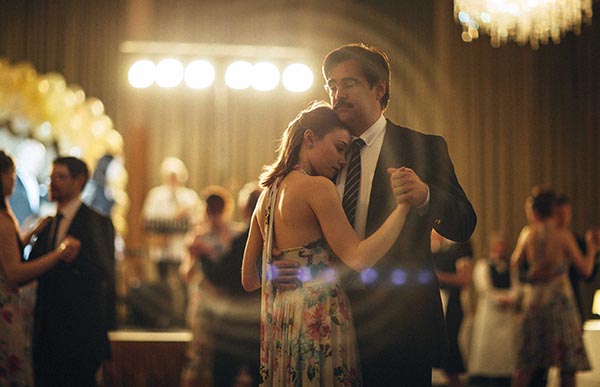Lanthimos’ film The Lobster blends the director’s signature deadpan comedy with his commentary on relationship building and attention span in the 21st century.
The Lobster may possibly be Greek director Yorgos Lanthimos’ best feature. Not only is the film the best example of Lanthimos’ style, but the 2015 black comedy, soft sci-fi drama also uses that style to enhance what the film’s thematic endeavors. In the film, David (a dry, hilarious Colin Farrell) goes to a special hotel after his wife cheats on him. The hotel is designed to help lonely singles find a new partner. If a person does not find a new relationship within a certain timeframe, that person will turn into an animal of his or her choosing (David has chosen a lobster, hence the film’s title). The premise alone is ludicrous, and the way everyone commits to the bit makes the film work that much more. The direction, performances, and absurd script all work together to act as a takedown on how relationships are perceived in the modern era.
The dry comedy certainly hits, but it is not the only trick Lanthimos uses to make his point. The cinematography fits the almost purposely bland style perfectly, but it still manages to be quite beautiful. The interior of the hotel, the forest surrounding it, and the big city in the second half of the film are all shot with an almost documentarian accuracy. However, cinematographer Thimios Bakatakis also sprinkle in a sepia-centered color palette, and Lanthimos directs and arranges with such precision, that the audience cannot help but keep their eyes glued to the screen, even if much of the film is conversation-driven. This technical mastery lures in the viewer, then hits that viewer over the head when the more absurd moments strike.
Lanthimos also effectively uses long takes to draw out the action. Part of the main message of The Lobster is how society has become parochial when it comes to important issues like finding a relationship, and Lanthimos uses his camera movement to perhaps reveal how society has also become inattentive and easily distracted when it comes to art. The long shots, such as David approaching a woman in a ballroom at the hotel to start a conversation, are meant to challenge the viewer, forcing the audience to pay attention. The editing is methodical and not fast-paced; instead, each scene takes its time developing, and the reward is much greater.

There are some miscellaneous moments where Lanthimos seems to poke fun of, in his apparent view, our low attention span society. In an early scene, a hotel maid lists all the strangely strict rules of the hotel, including one about haircuts. Only a few seconds later, a female guest asks the maid a question about haircuts that the maid had just answered.
Aside from the low attention span critique, Lanthimos is also interested in exposing problems with the way society builds relationships in the present. In the film, characters continuously introduce themselves by their identifiable, often “flawed,” traits, like Ben Whishaw’s Limping Man or Jessica Barden’s Nosebleed Woman. In the hotel, these characters are constantly exposed to organistic demonstrations depicting the benefits of relationships. The first half of the film reveals the ridiculousness of trying to rush into relationships by any means necessary, while the back half, where David escapes with the loners, who radically support singleness, criticizes those who look down upon people in relationships. This culminates in a stomach-churning final scene, where Lanthimos again tests the audience, asking if people need to have something arbitrary “in common” with another person in order to be happy within a relationship.
Speaking of the film’s story, The Lobster also utilizes several common narrative devices but does so in quirky, unexpected ways. A potential head-scratching creative decision in The Lobster is the inclusion of Rachel Weisz’s narration. Weisz’s character, known in the script only as Short-Sighted Woman and The Narrator, plays an integral role as David’s new love interest in the film’s back half, but the audience becomes familiar with her from the beginning, as she narrates, sometimes needlessly, the goings-on of David and the members of the hotel. Multiple reasons could be given for the inclusion of the narration, but it feels like Lanthimos is deploys the narration cheekily. Weisz’s redundant narration holds the audiences’ hand as Lanthimos guides us through his weird world with Farrell serving as the vessel.
Farrell and Weisz are not the only ones who fully commit to the absurdity on display. The stacked cast, including Olivia Colman, Jessica Barden, John C. Reilly, Léa Seydoux, and Ben Whishaw all give delightfully weird performances, and each gets a moment to revel in the absurdity. The amount of perfect line deliveries, blank facial expressions, and sidesplitting shenanigans are too many to number. These performances, along with Lanthimos’ script and directing prowess, unite in a way that makes a one-of-a-kind experience, one that takes all its idiosyncrasies and uses them to its thematic advantage.
The Lobster is not for everyone. Many will find the humor awkward, uncomfortable, or off-putting. Those who stick with it, though, will find a humorous takedown of society in the 21st century. Lanthimos holds nothing back, attacking the narrow-minded and yes, short-sighted, views we far-too-often have of important things in life ranging from art to relationships. What makes this attack work is that it does not feel like an attack, but rather a weird, farcical fever dream.
The Lobster is now available to watch on digital and on demand. Read our review of Yorgos Lanthimos’ Poor Things.

